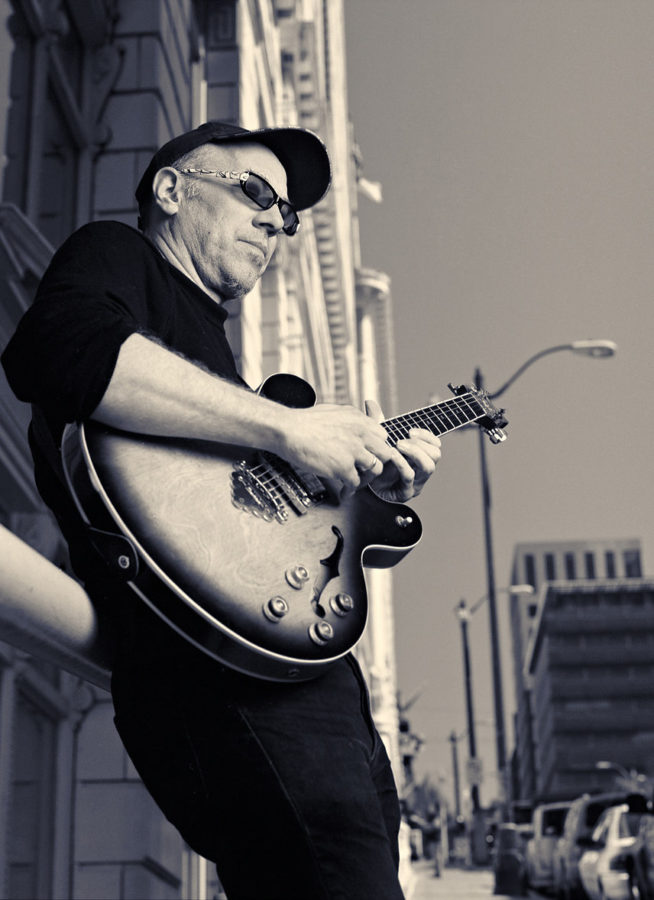Dan Balmer: Lincoln’s secret jazz legend
Advanced guitar teacher, Dan Balmer, has spent his life strumming the guitar.
Dan Balmer is a guitarist who lives and plays in Portland and teaches the Advanced Guitar class at Lincoln. He has played with the Tom Grant Band and two time Grammy winner Dianne Schuur. He currently teaches private lessons, directs jazz combos at Lewis and Clark College, and plays private gigs. Since Dan is a well known guitarist in the Portland music scene, I thought I’d ask him some questions.
Q: Where were you born? What was your early life like?
A: I was born in central Oregon. In my early life I was the youngest of my brothers. My father was a professor and mom was a piano teacher. I went to school at Jackson High School, before it turned into a middle school. There was always music in my house; it was always important.
Q: What led you to start playing guitar?
A: From an early age, I’ve always loved music. Some of my earliest memories are of songs, and music always moved me. My brothers were really into it too and I thought they’d think I was cool if i learned how to play.
Q: How did you go from playing as a hobby to playing professionally?
A: I always wanted to play professionally, and I was getting pretty good when I was young, so I played my first gig at 15. It was at a coffee shop on Barbur [Boulevard]. Then I played a bar at 16. Eventually, I played some school dances and other gigs, and by college I was starting to get calls for more work, while I made connections and slowly built up momentum. I played weddings, background music, concerts, nightclubs and even bar mitzvahs.
Q: How do you keep up your interest in playing? Why do you keep doing it?
A: I love it. I keep listening to new people and new records. I want to improve. I’m dedicated to music, and it’s what I have to show for my life.
Q: What is your favorite piece of music you have created?
It would be impossible to say, there are so many. There are at least eight songs that are my favorites, that are all unique to me, that people like and are emotional. Couldn’t say one. If We Never Meet Again and Change of Heart are two really good ones.
Q: What Is the best way to build connections in the music industry?
A: You have to get out there and do it. Go to jam sessions and meet people. Being proactive about playing and being immersed in it is very important. A lot of people are uncomfortable in doing those things.
Q: Do you have any advice for someone trying to make it in the music industry?
A: Be proactive and do anything you can. You have to write, meet new people, rehearse, look for gigs and constantly stay on it. You have to practice and develop new skills. It doesn’t come to you. Give it your best shot– maybe it will work out and maybe it doesn’t. There’s a lot of luck involved.
Q: What music do you think [Lincoln students] should listen to that we are unaware of?
A: Jazz, the tradition of the 50’s and 60’s of John Coltrane and Miles Davis, was really the apex of its art form. There was a time when it was popular. It was innovative, intellectual and political. Coltrane is great, people like that are just like Beethoven. You should listen to it.
Q: Now that you’re older and more well respected/accomplished, what are your goals in life? How have they changed?
A: My goal is to keep getting better, stay busy, play, grow and evolve. I want to grow in everything I do. What’s changed is I don’t think I’m going to make it big anymore. I’m convinced, actually. When you’re in your twenties or thirties, you think you’ll make it. Now I don’t think it’s gonna happen. They say, when you give up on being a star, it can be liberating. I enjoy my teaching and playing. I feel lucky to do this thing i love. It’s a personal path, your own unique path. An artistic path is unique. I want to keep staying on the path.

